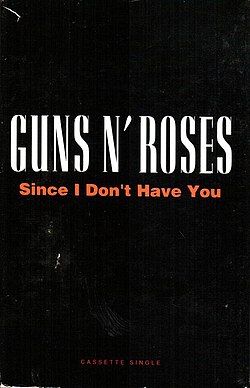| "Since I Don't Have You" | ||||
|---|---|---|---|---|
 One of pressings of the US single | ||||
| Single by the Skyliners | ||||
| B-side | "One Night, One Night" | |||
| Released | December 1958 | |||
| Recorded | 1958 | |||
| Genre | Doo-wop | |||
| Length | 2:40 | |||
| Label | Calico | |||
| Songwriters |
| |||
| Producer | Joseph Rock | |||
| The Skyliners singles chronology | ||||
| ||||
"Since I Don't Have You" is a song written and composed by Jackie Taylor, James Beaumont, Janet Vogel, Joseph Rock, Joe Verscharen, Lennie Martin, and Wally Lester. It was first a 1958 hit single for the doo-wop group the Skyliners on the US Billboard Hot 100. Country music singer Ronnie Milsap had a hit with the song in 1991. American hard rock band Guns N' Roses also had some success in 1994 with their version of the song which reached the top 10 on the UK Singles Chart.

